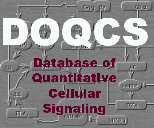
|
Enter a Search String | | Special character and space not allowed in the query term.
Search string should be at least 2 characters long. |
Molecule Parameter List for GTP.Ran-cytoplasmic | The statistics table lists the distribution of a molecule acting either as a substrate, product, enzyme or as a molecule within the network.
The text color of a molecule is highlighted by  color. color. | | Statistics |
Accession and Pathway Details | |
| Accession Name | Accession No. | Accession Type | Pathway Link | | RanGTPase | 70 | Network |
Shared_Object_RanGTPase, Nucleus, Cytoplasm | | This model represents a concentration gradient of RanGTP across the nuclear envelope. This gradient is generated by distribution of regulators of RanGTPase. We have taken a log linear plot of graphs generated by GENESIS and compared with the experimental graphs. |
GTP.Ran-cytoplasmic acting as a Molecule in RanGTPase Network
| Name | Accession Name | Pathway Name | Initial Conc.
(uM) | Volume
(fL) | Buffered | | GTP.Ran-cytoplasmic | RanGTPase
Accession No. : 70 | Cytoplasm
Pathway No. : 306 | 0 | 18000 | No | | cytoplasmic-GTP.Ran Cytoplasmic fraction of Ran-GTP complex Cytoplasmic volume = 1.8 pL = 1.8e-16m^3 Gorlich D et al (2003) EMBO J 22(5):1088-1100 |
GTP.Ran-cytoplasmic acting as a Substrate for an Enzyme in RanGTPase Network
Enzyme Molecule /
Enzyme Activity | Accession Name | Pathway Name | Km (uM) | kcat (s^-1) | Ratio | Enzyme Type | Reagents | RanGAP /
RanGAP[1] | RanGTPase
Accession No. : 70 | Cytoplasm
Pathway No. : 306 | 0.699998 | 10.6 | 4 | explicit E-S complex | Substrate
GTP.Ran-cytoplas
mic
Product
GDP.Ran-cytoplas
mic
| | RanGAP reaction on free RanGTP kcat = 10.6 /sec Km = 0.7 uM at 25oC Table 1. Gorlich D et al (2003) EMBO J 22(5):1088-1100 |
GTP.Ran-cytoplasmic acting as a Substrate in a reaction in RanGTPase Network
| Kd is calculated only for second order reactions, like nA+nB <->nC or nA<->nC+nD, where n is number and A,B,C,D are molecules, where as for first order reactions Keq is calculated.
Kd for higher order reaction are not consider. |
| Name | Accession Name | Pathway Name | Kf | Kb | Kd | tau | Reagents | | RanGTP_binding | RanGTPase
Accession No. : 70 | Cytoplasm
Pathway No. : 306 | 18.0004
(uM^-1 s^-1) | 0.0004
(s^-1) | Kd(bf) = 0(uM) | - | Substrate
GTP.Ran-cytoplas
mic
RanBP1
Product
RanBP1.RanGTP
|
GTP.Ran-cytoplasmic acting as a Product in a reaction in RanGTPase Network
| Kd is calculated only for second order reactions, like nA+nB <->nC or nA<->nC+nD, where n is number and A,B,C,D are molecules, where as for first order reactions Keq is calculated.
Kd for higher order reaction are not consider. |
| Name | Accession Name | Pathway Name | Kf | Kb | Kd | tau | Reagents | Cytoplasmic_
transfer | RanGTPase
Accession No. : 70 | Shared_Object_
RanGTPase
Pathway No. : 304 | 0.08
(s^-1) | 1.3
(s^-1) | Not applicable** | - | Substrate
GTP.Ran-nuclear
Product
GTP.Ran-cytoplas
mic
| | Approximation to achieve Cytoplasmic transfer as per kinetics described by Gorlich D et al (2003) EMBO J 22(5):1088-1100 |
** This is a trasport reation between compartments of different volumes. Therefore Kd is not applicable. Please Note Kf, Kb units are in number of molecules instead of concentration
| Database compilation and code copyright (C) 2022, Upinder S. Bhalla and NCBS/TIFR
This Copyright is applied to ensure that the contents of this database remain freely available. Please see FAQ for details. |
|
